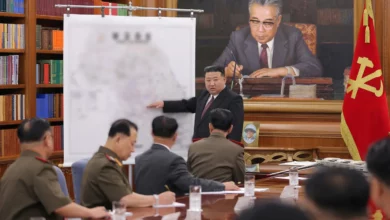Washington — President Barack Obama told Americans on Monday that US forces would not get bogged down trying to topple Muammar Qadhafi but stopped short of spelling out how the military campaign in Libya would end.
In a nationally televised address, Obama — accused by many lawmakers of failing to explain the US role in the Western air assault on Qadhafi's loyalists — said he had no choice but to act to avoid "violence on a horrific scale" against the Libyan people.
"We had a unique ability to stop that violence, an international mandate for action, a broad coalition prepared to join us," he said in his fullest defense of his strategy since air strikes began 10 days ago. "We also had the ability to stop Qadhafi's forces in their tracks."
But Obama set strict limits on his willingness to apply US military might, making clear Washington would not act as the world's policeman "wherever repression occurs," a sign he would avoid armed entanglement in other Middle East hotspots.
He pledged the United States would scale back its involvement to a "supporting role," with NATO taking over full command from American forces on Wednesday, but offered no prediction of when — or how — the mission would end.
Obama vowed to work with allies to hasten the day when Qadhafi leaves power but said he would not use force to remove him — as former President George W. Bush did in ousting Saddam Hussein in the 2003 US-led invasion of Iraq. Obama, elected in 2008, had strongly opposed the Iraq war.
"We went down that road in Iraq," Obama told military officers at the National Defense University in Washington. "That is not something we can afford to repeat in Libya."
He spoke on the eve of a 35-nation conference in London to tackle the crisis in the North African oil-exporting country and weigh political options for ending Qadhafi's 41-year rule.
COUNTERING CRITICISM
Obama sought to counter criticism at home that he lacked clear objectives or an exit strategy in launching the Libya mission, but he left unanswered the question of how long US forces would be involved and how they would eventually leave.
Obama's challenge was to define the limited purpose and scope of the US mission in Libya for Americans preoccupied with domestic economic concerns and weary of costly wars in two other Muslim countries, Iraq and Afghanistan.
"We will deny the regime arms, cut off its supply of cash, assist the opposition and work with other nations to hasten the day when Qadhafi leaves power," Obama said.
But he acknowledged "it may not happen overnight" and said Qadhafi may be able to cling to power. "Broadening our military mission to include regime change would be a mistake," he said.
Experts say failure to dislodge Qadhafi could lead to a bloody stalemate and require prolonged Western-led military action to protect civilians.
But Steven Cook of the Council on Foreign Relations think tank said coalition forces were trying to create an opportunity where Libyan rebels, who have made recent gains on the battlefield, "have at least a fighting chance to engage in their own regime change."
Obama's words were not enough to mollify Republican opponents who accuse him of failing to lead in global crises ranging from Middle East unrest to Japan's nuclear emergency.
"Americans still have no answer to the fundamental question: what does success in Libya look like?" said Brendan Buck, spokesman for House of Representatives Speaker John Boehner.
Obama is struggling to balance foreign policy challenges like Libya with his domestic priorities of jobs and the economy, considered crucial to his 2012 re-election chances.
Obama's prime-time speech came a day after NATO agreed to assume full responsibility for military operations in Libya,
The alliance's decision gave a boost to Obama's effort to show Americans he was making good on his commitment to limit US military involvement.
NATO will take charge of air strikes that have targeted Qadhafi's military infrastructure as well as a no-fly zone and an arms embargo.
Most polls show Americans divided over the Libya mission and believe on balance that the Obama administration and its allies do not have a clear goal in taking military action.




